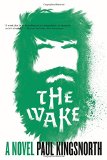Summary | Excerpt | Reviews | Beyond the book | Read-Alikes | Genres & Themes | Author Bio

Pity the poor, contemporary Irish novelist. If he or she writes a political novel, reviewers will invariably drone on about how growing up in the wake of "The Troubles" has left an indelible mark on the writer's conscience. If the story is a fantasy, here come the critical bromides about "the little people," and the inescapable "enchantment of the Emerald Isle." If the author tells a comic tale, it's often attributed to the native "gift of gab" and the legendary Irish wit. And if dour or dyspeptic, the novelist is placed firmly in the tradition of nationalistic hardship: political domination, the famine, and economic blight.
And then there are the literary ghosts (Swift, Lady Gregory, Yeats, Beckett, Doyle, McCourt, et al.), each an avatar of hauntingly beautiful or devastatingly barbed prose – and each, of course, unmistakably "Irish," casting a foreboding, even suffocating shadow across the literary landscape. Complete escape seems unlikely even for the most talented contemporary writer.
So here comes Paul Lynch, an Irish writer from Dublin with his second novel, The Black Snow. But Lynch, author of the critically well-regarded Red Sky In Morning, seems uninterested in escape – in fact he's doubling down on his Irishness by employing both a style, and a genre, that can't help but summon the spirit of the auld sod. Lynch's literary voice and cadence have very strong echoes of James Joyce (lines from Dubliners and Portrait of the Artist came regularly to my mind as I was reading). And in choosing to take on the mode of the "pastoral novel" – (see 'Beyond the Book') though The Black Snow is technically more of an "anti-pastoral," given the malignance of nature in the novel – Lynch revives a tradition that harkens back to the very beginnings of Gaelic literature (and as fans of the pastoral mode know, even further back, to ancient Greece and Rome).
As is often the case with pastoral works, not a great deal happens, plot-wise, in The Black Snow. The novel is set in Donegal, in the spring of 1945, and the pivotal event occurs immediately: a massive fire in a byre, a barn for livestock, which kills all the cattle and a local farmhand as well. The rest of the story narrates the efforts of the farm's owner, Barnabas Kane, to rebuild the byre – and puzzle out the mystery as to why most of the village residents seem so antagonistic about his efforts to reclaim his economic viability. There are flashbacks to Barnabas' former days as a newly arrived immigrant in New York City, helping build skyscrapers and courting his wife, and diary entries from Barnabas' laconic teenaged son Billy, who seems to be hiding a dark secret. Barnabas' long-suffering wife, Eskra, likely speaks for many readers in her growing befuddlement at her husband's refusal to sell the land and start a new life elsewhere.
The Black Snow is filled with ear-bending attenuations of Lynch's Irish-inflected English. His style takes a wee bit of getting used to. His frequent use of so-called "flat adverbs" (dropping the "–ly" endings of adverbs) strikes the modern ear strange. So we get evenings "pressing down gentle," rocks that get "tossed lazy," intuitions that "passed through him cold," and groups of people who "walked solemn." In addition, Lynch loves to play with syntax, subverting traditional subject-verb-object word order, making you wonder if you really read correctly what he just wrote. The book is filled with sentences like "Soot softly like snow that fell a brittle powder to the skin." And the language of the Irish countryside – from the "hasp of winter" to a "horse's withers," a "hank of shirt" to someone "flashing smiles with a billhook" (all from the first couple of pages) fill this novel. The diction and the rhythm of The Black Snow demand and reward close attention, the reader unweaving the beguiling skein of Lynch's yarn. Here's a typical chapter-opening sentence: "The silence of the farm spread malignant into the house, laid itself upon everything a dense weight."
Is such a style too self-consciously literary for some readers? Perhaps. The Black Snow is not a novel for people who want a story told in straight-forward, anodyne language. But for readers receptive to Lynch's bent prose, the novel confers a satisfying strangeness, its tilled linguistic landscape a garden of cockeyed delights, a place where "a lemon sun swung pale arcs of light" and "smoke chugged like blood arterial, as if some dark heart were pumping it relentless."
Given the setting and the style of The Black Snow, Lynch seems to have made peace with the terrible beauty of Ireland's literary legacy, undaunted by the oppressive weight of tradition. "History," Stephen Dedalus once noted, "is a nightmare from which I'm trying to awake." A century later, Paul Lynch has forged a dissonant, reflective music from those troubled dreams.
![]() This review
first ran in the June 3, 2015
issue of BookBrowse Recommends.
This review
first ran in the June 3, 2015
issue of BookBrowse Recommends.

If you liked The Black Snow, try these:

by Owen Sheers
Published 2016
An utterly stunning novel of love, loss, the insidious nature of secrets, and the transformative power of words. I Saw a Man fulfills the promise of Owen Sheers's acclaimed novel, Resistance.

by Paul Kingsnorth
Published 2015
"A work that is as disturbing as it is empathetic, as beautiful as it is riveting." - Eimear McBride, New Statesman
Your guide toexceptional books
BookBrowse seeks out and recommends the best in contemporary fiction and nonfiction—books that not only engage and entertain but also deepen our understanding of ourselves and the world around us.